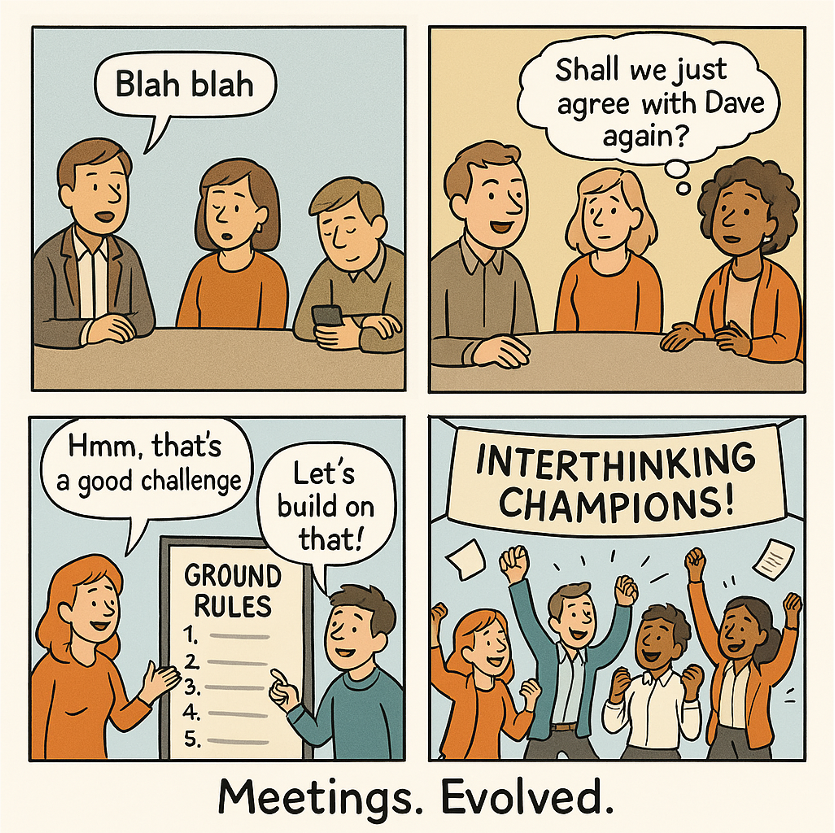My last three posts have focused on team stuff.
First, we looked at slice teams - a powerful approach to representative decision-making which overcomes the groupthink associated with top-down change management.
Next, we looked at how to build a cohesive team:
Then we looked at how to achieve team flow, the ‘God tier’ of collaborative working.
In this post - the last in this mini-series on how to build great teams - we’ll look at a super powerful strategy for making your team meetings as awesome as they can possibly be.
This approach is rooted in interthinking, a word coined by my former PhD supervisor, Professor Neil Mercer. So let’s quickly dive in to interthinking, and then we’ll look at the strategy.
Interthinking: harnessing collective intelligence
The story of human achievement often focuses on exceptional individuals – visionary leaders, ground-breaking inventors, celebrated artists. Yet recent research highlights a more profound truth: exceptional achievements rarely happen in isolation. Instead, great ideas and innovations usually emerge through vibrant networks of collaboration, critique, and conversation.
In their excellent book Interthinking, Karen Littleton and Neil Mercer explore how people use spoken language to think together, create new ideas and solve complex problems. They coined the term ‘interthinking’ to emphasise that conversation is not merely about exchanging information but also about creating and refining ideas collectively. Through interthinking, teams become smarter, achieving results far beyond what individuals working alone could accomplish.
Why is interthinking important?
At first glance, bringing bright individuals together might seem enough to guarantee outstanding results. However, research consistently demonstrates that collective performance doesn’t automatically surpass individual potential. Brilliant minds can still collectively make poor decisions, often due to a phenomenon known as ‘groupthink’. This occurs when groups prioritise consensus and harmony over critical thinking and honest debate.
Interthinking stands as the opposite of groupthink. It thrives on openly challenging assumptions, asking probing questions, and rigorously testing ideas. Effective interthinking enhances a team's creativity, productivity, and problem-solving capabilities, enabling it to become genuinely greater than the sum of its parts.
Q: How can we make interthinking happen on the regular?
A: Ground rules!
To make interthinking happen as much as possible, Littleton and Mercer suggest that teams must establish clear ground rules. Ground rules act as a shared understanding, guiding how team members communicate and collaborate effectively. Such guidelines help create an environment where every voice is valued, ideas are rigorously examined, and collective intelligence flourishes.
Here are some tried=and-tested practical ground rules your team might adopt:
1. Everyone is an equal member
Hierarchical structures are common in organisations. However, within your team, hierarchy should take a back seat. Each member, regardless of position, should feel equally empowered to contribute and influence decisions. When everyone feels equally valued, open and honest dialogue naturally follows.
2. All relevant information should be shared
Critical information, even if inconvenient or challenging, must be shared openly. Encouraging transparency ensures well-rounded discussions, where no stone is left unturned. This practice actively prevents groupthink by welcoming diverse perspectives and debate.
3. Tech should be put away
Even the silent presence of mobile phones or laptops can diminish cognitive focus and impair productive dialogue. Removing unnecessary devices during meetings sends a clear signal that team time and interaction are valued and protected.
4. Everyone should feel free to air honest views
Creating an environment where honesty is not just encouraged but expected is fundamental. Team members must feel safe to share genuine thoughts and concerns without fear of negative repercussions.
5. Everyone should be prepared to have their views challenged
Constructive challenge is essential for interthinking. Teams should explicitly encourage respectful debate, promoting an atmosphere where changing one’s mind in light of new evidence or arguments is seen as a strength, not a weakness.
6. Everyone should work towards agreement where possible
Consensus is powerful. Even when disagreements arise, teams should adopt a solution-oriented approach. Agreeing to trial strategies temporarily, then reviewing outcomes and revising as necessary, helps maintain team momentum while accommodating diverse views.
7. Confidentiality should be maintained
When having frank discussions, especially involving sensitive issues or specific individuals, confidentiality is crucial. Clearly communicate expectations around privacy, ensuring team members feel safe to speak openly.
Some tips on how to use ground rules
The first time you use ground rules, share the 7 ground rules listed above and ask people whether there are any that they’d like to add, remove or tweak.
During the meeting, keep them on display so that people can refer to them and remind themselves how the team is supposed to work together.
Tell people that they can refer to the ground rules at any point. For example, if you’ve discussed an agenda item but not everyone has contributed, somebody might say "We haven’t all contributed yet. Does anybody have anything to add before we move on?”
At the end of the meeting, return to the ground rules and ask ‘How well did we stick to the ground rules today?’
Whenever the team comes together, start by sharing the ground rules again. Ask:
Is everyone still comfortable with our rules?
Do any rules need adding, removing, or adjusting?
How effectively are we communicating and collaborating?
Is there a risk we are slipping into groupthink?
Frequent reflection ensures these ground rules remain effective, adaptive, and meaningful.
Harnessing collective intelligence through interthinking
The benefits of interthinking are immense. By prioritising clear, respectful, and open dialogue, your team can tap into its collective intelligence to achieve outcomes far beyond what any individual could manage alone.
When your team deliberately practices interthinking, the result is not merely effective collaboration – it’s transformative. Your team becomes smarter, more innovative, and better equipped to overcome challenges, achieving outcomes that far surpass the sum of individual efforts.
Make interthinking central to your team's practice, and watch your collective intelligence – and success – grow exponentially.
School improvement is a complex beast. There are SO MANY things that we could focus on - curriculum, behaviour, assessment, feedback, literacy, pedagogy… the list is practically endless. And often in schools, leadership teams try to do too much at once and end up spreading themselves too thin. The question is, how should we decide what to focus on? This will be the focus of my next post.






Some simple and really useful tips for understanding responsibility and effective working relationships. Thanks James.